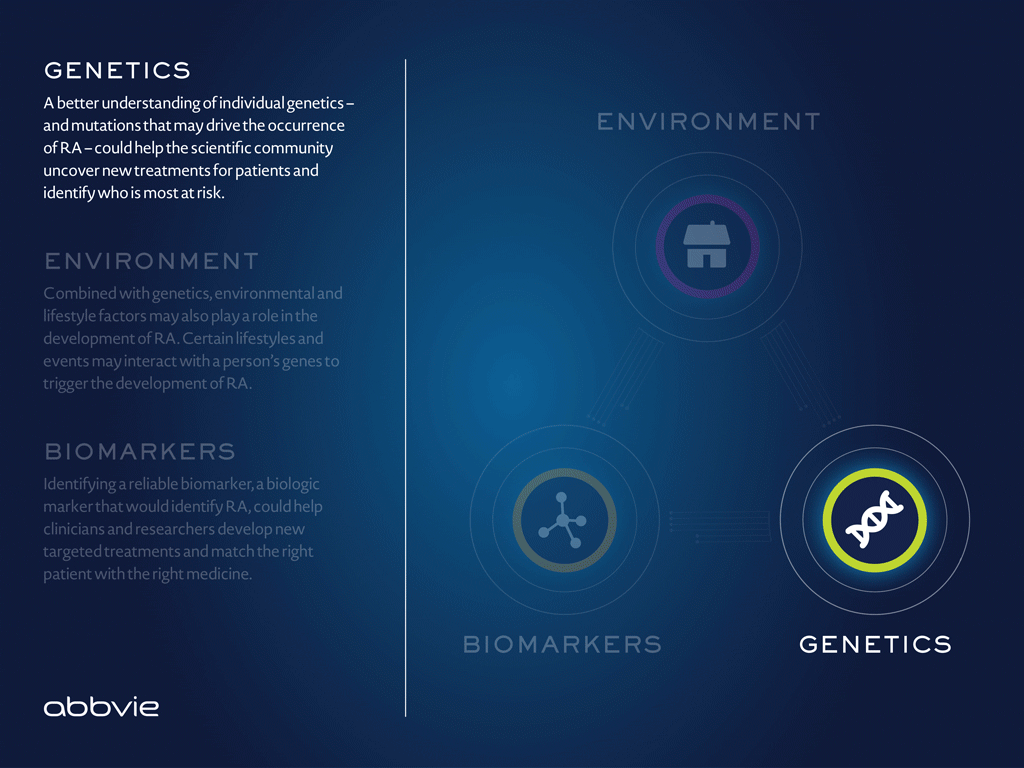AbbVie Rheumatology
We have been striving to advance the standard of care in rheumatology for over 20 years. We are committed to creating a better tomorrow for patients everywhere.
RO-ABBV-200026. Date of preparation: September 2021
A Legacy of Innovation
Since our beginning, Rheumatology has been a key focus for AbbVie. Our curiosity and dedication remain unyielding as we use cutting-edge science to help improve our understanding of promising new pathways and targets, with the goal of delivering better treatment approaches for patients with rheumatic diseases.
Learn more about our Rheumatology focus areas:
Rheumatoid Arthritis (RA)
This chronic, immune-mediated disease causes pain, stiffness, swelling and loss of joint function. RA can reduce patients’ ability to perform everyday tasks.
Juvenile Idiopathic Arthritis (JIA)
Including several forms of chronic arthritis, this immune-mediated disease affects children ages 16 and younger. For patients living with JIA, early diagnosis and treatment are important.
Psoriatic Arthritis (PsA)
This disease, associated with psoriasis, causes chronic pain, stiffness and swelling in the joints. Early diagnosis is important.
Axial Spondyloarthritis (axSpA)
A chronic inflammatory disease, axSpA affects the spine causing back pain. Not all forms of axSpA show up in an x-ray even if there are clear signs of inflammation; ankylosing spondylitis (AS) is a form of axSpA that does show up in an x-ray. AS is more common in men, but women are often underdiagnosed.
Uveitis
This group of eye diseases is characterised by inflammation of the uvea, the middle layer of the eye. If left untreated, uveitis can lead to reduced vision or vision loss.
Systemic Lupus Erythematosus (SLE)
The most common type of lupus, especially among women of childbearing age, this immune-mediated disease is associated with inflammation of multiple organ systems.
Pioneers in Science
Targeted Treatments
In order to develop targeted therapies, our scientists have demonstrated an unwavering focus on understanding what makes the immune system turn on patients causing RA and other immune-mediated diseases. This knowledge allows us to target specific enzymes involved in the process.
Delivering a One Two Punch
Immune-mediated diseases are complex and often operate through complementary pathways. We are exploring ways to inhibit multiple disease pathways and enable greater precision through technologies like Antibody Drug Conjugates (ADCs) and combination therapies. First developed for oncology, ADCs have the potential to deliver anti-inflammatory medicine directly to a target. Combination therapies may be needed to combat complex immune-mediated diseases by delivering two therapies in one package.
New treatment for patients
A better understanding of individual genetics – and mutations that may drive the occurrence of RA – could help the scientific community uncover new treatments for patients and identify who is most at risk
Key Pathways
JAK1
Transmits messages from the outside to the inside of a cell that drive an immune response
IL-23
Activates helper T-cells and certain macrophages, which produce additional cytokines that are involved in the inflammatory process.
TNF- α
Contributes to the induction and maintenance of the inflammatory immune response.
BTK
Involved in the maturation of B cells, which produce antibodies that help the body protect itself.
Stories
The Future of Rheumatoid Arthritis: How Genes, Lifestyle and Environment Factor In.






